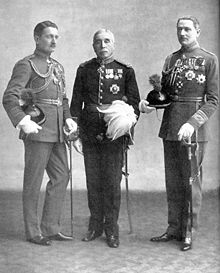William Salmond (British Army officer)
Sir William Salmond | |
|---|---|
 Sir William Salmond (centre) with his sons | |
| Born | 25 August 1840 York, England |
| Died | 8 November 1932 (aged 92) Bruton, Somerset, England |
| Allegiance | United Kingdom |
| Service | British Army |
| Years of service | 1857–1902 |
| Rank | Major General |
| Battles / wars | Anglo-Egyptian War Second Boer War |
| Awards | Knight Commander of the Order of the Bath Mentioned in Despatches |
| Relations | Gwen Salmond (daughter) Sir Geoffrey Salmond (son) Sir John Salmond (son) |
Major General Sir William Salmond, KCB (25 August 1840 – 8 November 1932) was a British Army officer.
Military career
[edit]Grandson of Major General James Hanson Salmond, Military Secretary to the East India Company and author of The Mysore War,[1] William Salmond was born the son of Lieutenant Colonel James Salmond (1805–1880) and Emma Isabella Coke (d. 1886), daughter of D'Ewes Coke (1774–1856) and Harriet Wright.[2][3][4] He studied at the Royal Military Academy, Woolwich, and was commissioned into the Royal Engineers in October 1857.[3]
Salmond was appointed an Instructor in Musketry in November 1872 and took part in the Anglo-Egyptian War in 1882, during which he was mentioned in despatches.[3] He became Assistant Director of Works (Barracks) at the War Office in April 1883, Assistant Adjutant-General for the Royal Engineers in October 1884 and Assistant Quartermaster-General in April 1886.[3] He went on to be Commander, Royal Engineers for the Home District in July 1890, Deputy Inspector-General of Fortifications at the War Office in May 1891 and finally Deputy Adjutant-General for the Royal Engineers in 1896.[3] He continued in this role during the Second Boer War and stepped down as it ended in June 1902,[5][3] retiring from the army on 25 August.[6] In the October 1902 South African Honours list, he was promoted to a Knight Commander of the Order of the Bath (KCB),[7] and he was invested with the insignia of the order by King Edward VII at Buckingham Palace on 18 December 1902.[8]
Salmond died at his home at Whaddon House near Bruton in Somerset on 8 November 1932.[3]
Family
[edit]In 1874 Salmond married Emma Mary Hoyle; they had two sons, Geoffrey and John, and a daughter, Maizie.[3] His daughter Mary Gwendoline was an artist.[9][10]
References
[edit]- ^ "Obituary: Sir Geoffrey Salmond Air Chief Marshal And Chief Of The Air Staff". The Times. London. 28 April 1933. p. 19. Retrieved 5 August 2012.
- ^ Burke's Genealogical and Heraldic History of the Landed Gentry, 17th edition
- ^ a b c d e f g h "Obituary: Sir William Salmond" (PDF). Retrieved 5 August 2012.
- ^ Vere Langford, Oliver (1899). The History of the Island of Antigua. p. 66.
- ^ "No. 27454". The London Gazette. 15 July 1902. p. 4512.
- ^ "No. 27470". The London Gazette. 2 September 1902. p. 5685.
- ^ "No. 27490". The London Gazette. 31 October 1902. p. 6910.
- ^ "Court Circular". The Times. No. 36955. London. 19 December 1902. p. 4.
- ^ Irish Art Auction. Whytes. Retrieved 20 August 2014.
- ^ Obituary Mary H. Hoyle Salmond. Retrieved 20 August 2014.
